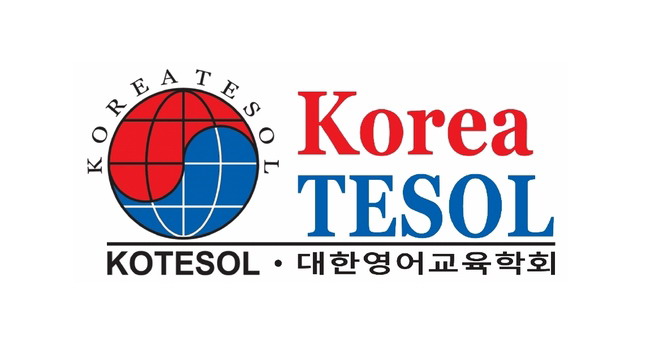The Jeollanamdo Language Program: Still Going Strong
An Interview with Chris Devison
Gwangju has its GET (Gwangju Guest English Teachers) program, first-language expats teaching English, and Jeollanam-do has its JLP (Jeollanamdo Language Program). While last month’s interview dealt with the GET program (Gwangju News, February 2022), this month we interview the coordinator of the JLP, Chris Devison, to get a first-hand account and status report on the JLP, and on its coordinator, too! — Ed.
KOTESOL: Hi, Chris, and thank you for making time for this interview. In this interview, we will soon be getting to questions about the Jeollanamdo Language Program, but first, could you tell us a little about yourself before coming to Korea?
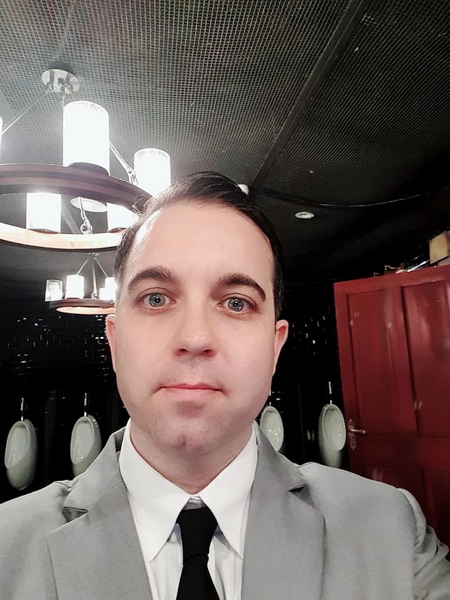
Chris Devison: Thank you for having me. It is a pleasure to share some info about the Jeollanamdo Language Program [JLP] with your readers. I am originally from a small town in Eastern Canada, close to Kilometer 1 of the Trans-Canada Highway, on the shores of the Atlantic Ocean.
KOTESOL: What prompted you to move from the western shores of the Atlantic to the western shores of the Pacific, to Korea? Did you originally come in JLP?
Chris: Unfortunately, my home area saw its heyday in the early 1900s with both the coal and steel industries. Unless you were involved in fishing, it was common for my parent’s generation to head to central Canada (Ontario) and for my generation to go West (Alberta) to work in oil and gas. I guess I just went a little further and now find myself as far away from home as possible here in Korea. I would like to note that this was completely unintentional, and I did not realize this until after being here for a few years.
Actually, I considered myself fortunate coming out of university with two decent positions in my home city of Sydney (yes, Canada has a Sydney, too), both in the social work field. This meant long hours and little free time. However, it also gave me my introduction to working in schools through the various educational programs I was running and my first coordinating experience for Big Brothers and Big Sisters of Canada.
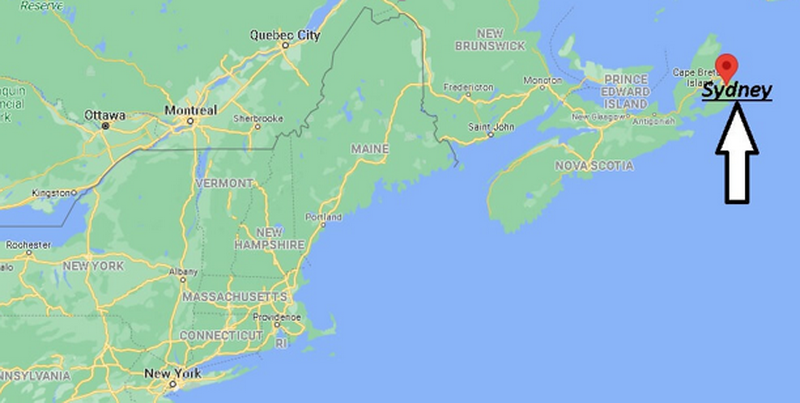
The reality was that after student loans, car payments, and rent, I had very little money and time left for exploration. After a few years of this grind and the growing feeling that something was missing, I met someone who had just come back from Korea and spoke highly of the experience. Although this was something I would normally never do, to many people’s surprise, a couple months later, I was boarding a plane for my first trip abroad with little knowledge of what I was actually getting into.
Much younger than I am now, I found myself in the thick of things working at a larger academy in the center of Busan. As you can imagine, this was a stark difference to the quiet area I grew up in. My first year was full of excitement and so many great memories. This left me with the desire to continue in Korea. Although Busan is a great city, it was not a place I wanted to be living in for a lifetime, and I found myself missing the quieter surroundings I was accustomed to.
I left Busan for Suncheon, Jeollanam-do, and started my journey in the public school system. This is where I have been since, first as a teacher, and eventually as the JLP provincial coordinator.
KOTESOL: JLP got its start, I hear, because Jeollanam-do did not want to be part of the nationwide EPIK program. Is that correct? How is, or was, JLP different from EPIK, and what exactly is the current relationship between the two?
Chris: This is a tough question to answer because it could have been answered differently throughout the various stages of my career. Its origin story would be something along the lines of what you said though. I believe the higher-ups here at the time felt Jeollanamdo could be better served if they looked after things themselves. Korea tended to, and still does, favor Seoul and the other larger metropolitan areas, leaving Jeolla as less of a priority or even forgotten. This, coupled with Jeolla being the most rural province, presented many problems. The work-around was to manage things themselves, so they could better look after the province’s unique English education needs by being independent.
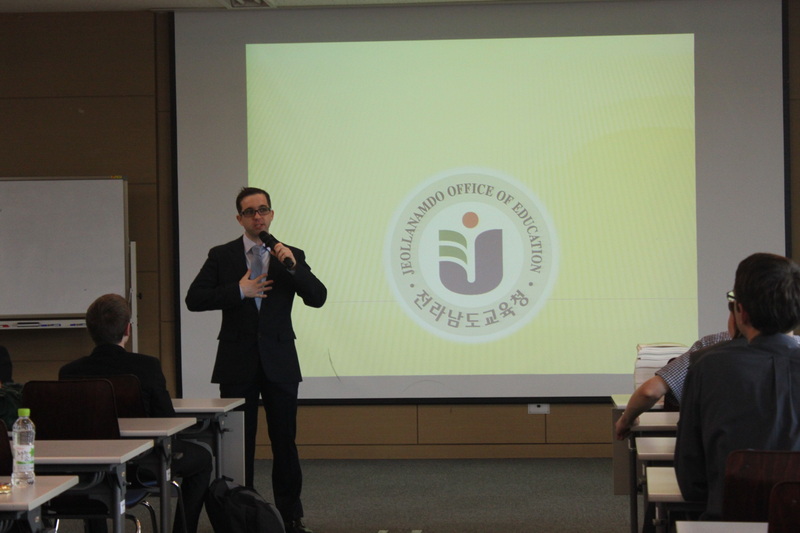
Even in times when JLP seemed most separated from the EPIK program, they were still heavily influenced by them. National standards, guidelines, and the standardized contracts that we have become familiar with in Korea were still set by the Ministry of Education (MOE). JLP could and did change somethings (usually small adjustments such as additional vacation days or higher salaries) in an attempt to attract people to our more rural area, but things were nonetheless the same.
Over time, things changed a lot, and not that much at all, if that makes sense. Newer guidelines around recruitment made it difficult for non-EPIK affiliated recruiters to meet the government standards pushing out the smaller non-Korean outfits. In addition, the continued pressure from increasingly stringent standards set by the MOE made it difficult for provincial or regional offices of education to maintain or initiate their own programs that stood out from the crowd.
Today JLP and EPIK are synonymous. EPIK looks after all of Jeollanam-do’s recruitment; other agencies are only used as a last resort when EPIK cannot meet demand. The contracts mirror each other with a few minor differences in favor of JLP teachers.
KOTESOL: So, in a nutshell, JLP is the Jeollanam-do version of EPIK. What are the main differences for native English speakers working in the Gwangju Guest English Teachers (GET) program and the JLP?
Chris: I think I would need to see a GET program contract to answer confidently on the specifics, but I believe they are very much the same. Both have to meet the standards set by the MOE and the Korea Immigration Service. I am not sure about GET’s transfer policy or if they have one, but JLP does offer the opportunity for our teachers to transfer within our province at the end of their one-year contract.
KOTESOL: I believe co-teaching or team-teaching is one of the main purposes of employing native speakers in JLP? How well is that working?
Chris: I would say there is very little team-teaching happening. It looks great on paper, but when it comes down to orchestrating the planning and comfort with one’s teaching partner, it seems to be thrown to the side for the ever-too-common and much more practical “one teach, one support” model. This generally works and, with the right team, can work extremely well. However, I feel other co-teaching models are highly underutilized in our classrooms, especially for troubleshooting the common difficulties that many of us face, such as behavioral issues or discrepancies in fluency levels.
KOTESOL: JLP places expat native English-speaking teachers is public schools. Are placements made to elementary, middle, and high schools? If so, how are selections made to these different school levels?
Chris: Yes, all three levels and at foreign language centers, otherwise known as English Towns. Our office receives the incoming teachers’ files from EPIK to review. During this process, we look at each applicant’s qualifications, experience, and even age. Considering these factors and anything else that stands out in their file, the supervisor tries to choose the most suitable placement for each.
KOTESOL: As JLP services the entire province, some placements can be to quite rural areas, including the province’s many remote islands. How well do expat teachers cope with such rural placements?
Chris: There is no doubt that remote positions can be much more challenging. I think some people excel there, but unfortunately, some can struggle. The general trend is for a rurally placed teacher to transfer to a more populated area of the province at the end of their first contract. Some people enjoy the quieter and often more laidback nature of a rural school. This, paired with the improved infrastructure linking many islands with bridges to the mainland, has improved the renewal rates of rural positions.
KOTESOL: What aspects do JLP teachers like most about the program? And what are the biggest challenges for them – in or outside of teaching in Korea?
Chris: I think the program here, as well as the many others in the country, offer a great opportunity to live and work abroad. It really is an amazing experience! I am reminded of this every time I have a group of wide-eyed newbies entering Korea for an orientation. With this, though, there is a lot of uncertainty, so I think our teachers feel better knowing they have a tight-knit supportive foreign community. It is a bit of a small-town mentality, and the teachers we have are each other’s best resource. When I polled our teachers about what they liked most about living in Jeollanam-do, the results reinforced this. Other reasons why our teachers preferred Jeolla were the local Korean people, food, and nature.
As for challenges, there are many, but I think the main challenge is navigating Korean culture. Most can do this successfully on a day-to-day basis, but over time, an accumulation of little issues can build up, manifesting into a larger issue if left unchecked. To counter this, it is great to be aware through self-reflection and continued research. Some things I have found to be extremely helpful to me have been info on tight and loose cultures and Geert Hofstede’s cultural dimensions theory.
KOTESOL: Yes, six dimensions – collectivism, power distance, masculinity/femininity, uncertainty avoidance, long-term orientation, and indulgence – each being a continuum with two extremes as bookends. You have spent quite a few years now as JLP program coordinator. What exactly does that position entail?
Chris: I jokingly consider myself a handyperson of English education in Jeollanam-do, as my duties can sometimes seem limitless. I take pride in coordinating, trying, even if in a small way, to make the lives of our teachers better. With a caseload of over 300 teachers, this alone keeps me busy, but it is something I truly enjoy.
Unfortunately, I have a vast range of other duties that can take me away from this. Honestly, I do not know what to expect when I enter the office in the morning. My well-intentioned plans might need to be thrown to the wayside to look after an issue that arises or some task someone else deems to be more urgent.
I also take an active role in teaching through my office, at the Jeollanamdo International Education Institute, the JIEI, also in Yeosu. I teach in our English camps, KET [Korean English teachers] and GET [guest English teachers] training, online programs, and community-based programs. I may do an elementary camp in the morning and teach adult Korean English teachers online in the evening.
KOTESOL: How big is the JLP program, and has it been affected by the COVID-19 pandemic?
Chris: We are currently at just over 300 teachers. This number is on a slow decline, but this is mostly due to population decline, a prominent issue in Jeollanam-do, not due to COVID-19. Of course, COVID-19 has complicated things a lot, but we still have been able to have full intakes of new teachers, each February and August, minus the odd last-minute cancelation.
KOTESOL: I heard that the TaLK [Teach and Learn in Korea] program has been completely discontinued in Korea due to the pandemic. I believe most TaLK teachers were placed in rural schools – does the termination of that program in any way impact your program?
Chris: TaLK is a completely separate program from JLP, but you are correct in hearing that it has been discontinued in Korea. This was something that was coming for a long time, and the MOE finally cut funding. I want to add that this is a nationally funded program, whereas regular public schools are provincially and regionally funded. To my knowledge, there are no plans for this to happen to JLP or any other program. We fully expect to keep teachers in our province’s schools in the future.
Also, although TaLK was cut, I am happy to say that Jeollanam-do will continue the program for at least one more year, even if in a reduced capacity. Our office even took on a few transfers from other provinces.
KOTESOL: Well, that is good to hear. TaLK has serviced some quite rural areas that had never before had a native English-speaking teacher. Turning to COVID-19, how difficult was it for JLP teachers to suddenly have to adjust to teaching in a pandemic?
Chris: Initially when things first happened, it was a disaster. This was no fault of our teachers. Nobody was prepared for it, and it was difficult to get clear guidelines on how to proceed. As the pandemic has progressed, people have become accustomed to the last-minute changes and comfortable with the software and online classroom. The teachers still lack sufficient resources and training, but they sure have done a great job, given the circumstances. I think all teachers should be given a handsome raise because of this mess.
KOTESOL: And a distinguished service award! Looking forward, what changes might be coming in the future for JLP?
Chris: After the last few years, I find it more and more difficult to try to predict the future. However, I think we will surely see some changes. As I mentioned, I expect we will see slightly reduced numbers, slightly being the key word. I think, and hope, Korea will start to embrace various teaching models better utilizing the co-teaching team. Technology will become a more prominent part of our lessons with online teaching becoming an integral part of Korean education.
KOTESOL: Yes, I think the pandemic has fast-forwarded our acceptance of technology for education. Let us move outside of the classroom and the office. What do you do in your spare time, if spare time is something that you actually have?
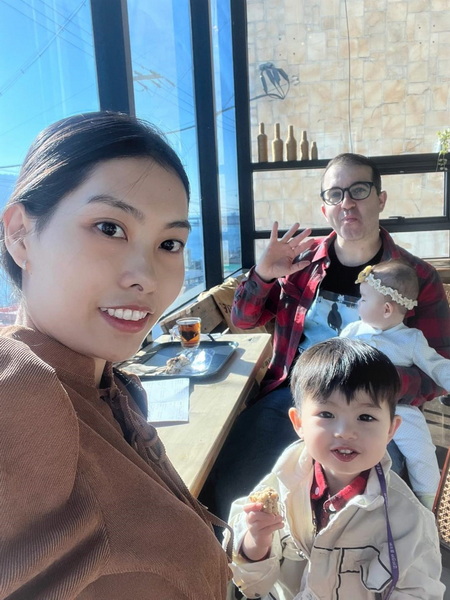
Chris: It is something I wish I had more of, but it comes with the territory. My free time is dedicated to my lovely wife and our two beautiful children. We have a son (age two and a half) and a daughter (seven months old). With our children being so young, we are rather busy, but we could not be happier. They bring us so much joy.
Both my wife and I enjoy cooking and gardening. We grow almost everything imaginable that is suitable for this climate and even have some chickens that provide us with eggs. We also like getting out to some of the beautiful coffee shops that seem to be all over Yeosu. We do not really have much time for anything else to be honest.
KOTESOL: Though it can be time consuming, providing the family with fresh eggs and fresh produce can also be relaxing, enjoyable, and eco-friendly. Now, one last question – and probably the hardest one – what are your plans for the future: the near future and the not-so-near future?
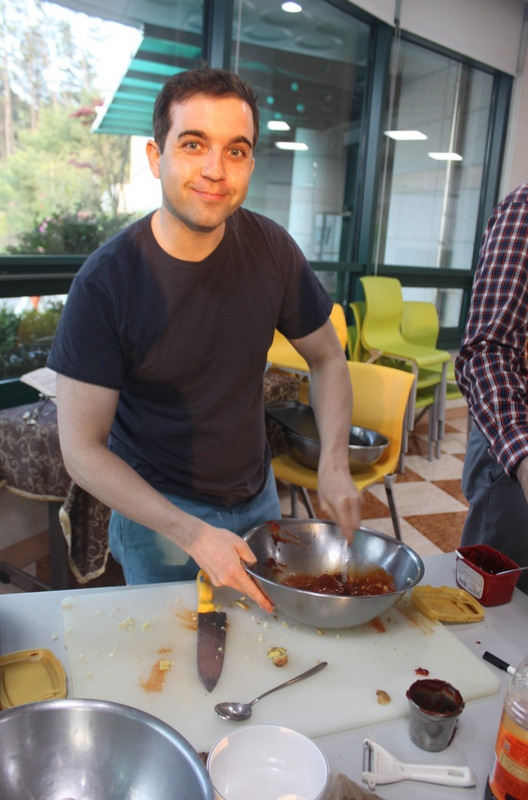
Chris: My main priority is being a great dad and not driving my wife too crazy. So far, I think I have been successful, and I might even be getting better at it. Admittedly, I still have a lot to learn though, but I continue to try. “A student of life,” as they say.
I take this approach to my life in Korea, and my work also. There is still so much to learn, but I think that makes it enjoyable. Although work presents regular challenges, I enjoy them and the diversity in what I get to do. I feel satisfied with my job and life in Jeolla, especially in Yeosu. It feels like home again, next to the sea.
KOTESOL: The challenges of teaching, the challenges of coordinating English teachers, the happiness of a family, the scent of the sea breeze, the feeling of “home” – that sounds like a quite satisfying combination! Well, thank you, Chris, for this in-depth look into the Jeollanamdo Language Program, your activities as program coordinator, and even a peek into your personal life. It has made me more knowledgeable, and I think it will do much the same for our readers!
Interviewed by David Shaffer.
Photographs courtesy of Chris Devison.
The Interviewer
David Shaffer has been involved in TEFL and teacher training in Gwangju for many years. As vice-president of the Gwangju-Jeonnam Chapter of KOTESOL, he invites you to participate in the chapter’s teacher development workshops (now online) and in KOTESOL activities in general. He is a past president of KOTESOL and is currently the editor-in-chief of the Gwangju News.
Gwangju-Jeonnam KOTESOL Upcoming Events
The 29th Korea TESOL International Conference
- More Than Words: Teaching for a Better World
- April 30 – May 1, 2022 (virtual)
- https://koreatesol.org/IC2022
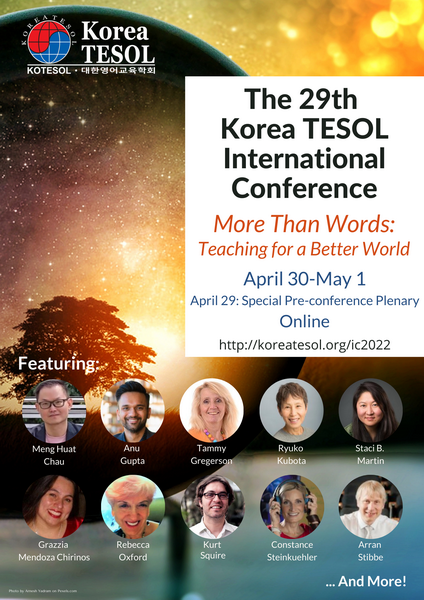
Check the Chapter’s webpages and Facebook group periodically for updates on Chapter events and other online KOTESOL activities.
For full event details:
- Website: http://koreatesol.org/gwangju
- Facebook: Gwangju-Jeonnam KOTESOL



